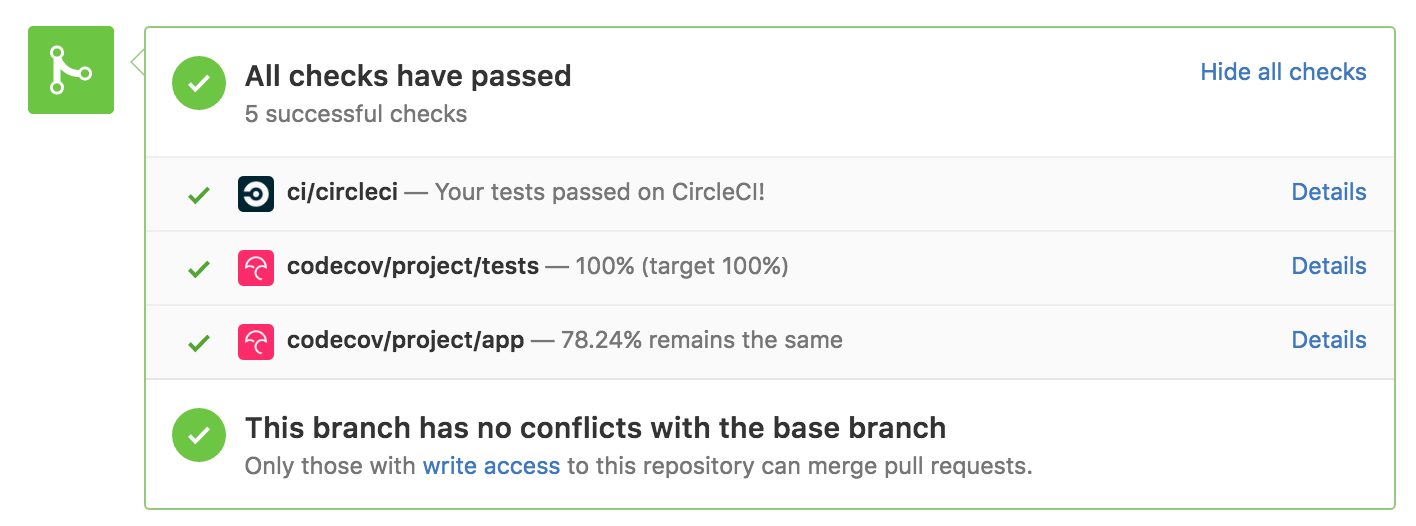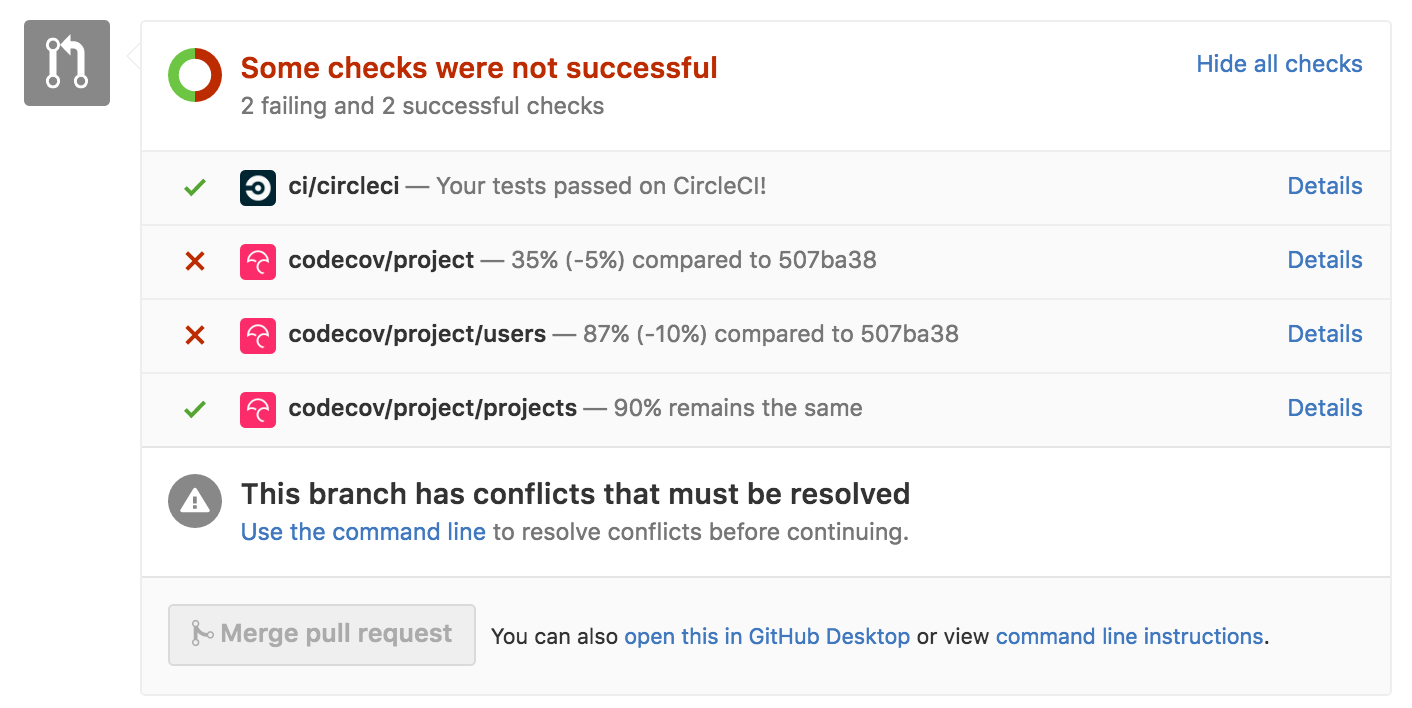Status Checks
Useful for blocking Pull Requests that don't meet a particular coverage threshold.
Project Status
The codecov/project status measures overall project coverage and compares it against the base of the pull request or parent commit.
coverage:
status:
project:
default: # default is the status check's name, not default settings
target: auto
threshold: 5
base: auto
flags:
- unit
paths:
- "src"
# advanced settings
branches:
- master
if_ci_failed: error #success, failure, error, ignore
informational: false
only_pulls: false
New to the Codecov yaml?View the codecov.yml documentation here.
Basic Configuration
coverage:
status:
project: trueCustom Configuration
target
auto | <number>
Choose a minimum coverage ratio that the commit must meet to be considered a success.
autowill use the coverage from the base commit (pull request base or parent commit) coverage to compare against. This is the default.<number>you can specify a target of an exact coverage number such as75%or100%(string, int, or floataccepted).
threshold
<number>
Allow the coverage to drop by <number>%, and posting a success status.
base
[Deprecated as of July 2020 -- Codecov's product roadmap includes a novel way to manually pick base of pull requests]
flags
Flags are a list of user defined Flags, and the impact on their coverage. You can specify an array of flags as follows:
coverage:
status:
project:
default:
#...
flags:
- flag1
- flag2
- ...and the combined coverage from those flags will be reported. Before using flags, it is highly recommended to read more about their use.
paths
Similar to flags, an array of paths and/or regular expressions can be provided and the status will report the combined coverage for the files that match the path name / regular expression.
Advanced Configuration
While Codecov defaults should be sufficient for most use cases, below are some advanced features to personalize your experience even more.
branches
The branches that, when used, will trigger this status.
if_not_found
Settings are 'success' and 'failure' the default is 'success'.
failure: the status will fail if there is no report for the headsuccess: the status will pass if there is no report for the head. Use this on commits / PRs where you won't be uploading coverage but still want codecov status checks to pass.
informational
Use Codecov in informational mode. Default is false. If true is specified the resulting status will pass no matter what the coverage is or what other settings are specified. Informational mode is great to use if you want to expose codecov information to other developers in your pull request without necessarily gating PRs on that information.
only_pulls
Only post a status to pull requests, defaults to false. If true no status will be posted for commits not on a pull request
if_ci_failed
Settings are 'success' and 'error' the default is 'error'.
Options are:
error: Will set the status to success only if the CI is successfulsuccess: Will set the status to success even if the CI fails
flag_coverage_not_uploaded_behavior
Determines how we handle status checks for which no flag coverage has been newly uploaded on a commit. This includes status checks where flags have carriedforward coverage (since coverage was no newly uploaded), as well as flags for which coverage is missing entirely.
Options are:
include: (default) All the status checks defined in the YAML file will be processed and sent as normal.exclude: Status checks that haven't newly uploaded any flag coverage will not be sent.pass: Status checks that haven't newly uploaded any flag coverage will be passed automatically.
This is useful if, for example, you're working on a project in a monorepo and don't want to see status checks related to other projects.
Note that this only applies to status checks that specify flags. If there are no flags on a check, the status check will be processed as usual.
removed_code_behavior
For a full breakdown of all the ways we handle removed code in your project status checks, please see our Removed Code Behavior page.
Excluding status checks for unrelated projects (Example)
Below is an example of using the flag_coverage_not_uploaded behavior to omit status checks from unrelated projects.
coverage:
status:
default_rules:
flag_coverage_not_uploaded_behavior: exclude # don't send status checks that don't have flag coverage uploaded
project:
projectA:
target: auto
flags:
- projectA-unit
- projectA-integration
projectB:
target: auto
flags:
- projectBIn this example, if a PR is opened in projectB then the status check for projectA won't be sent, as long as no coverage for projectA was uploaded on the PR.
Note that this requires that the CI process in projectB only uploads to Codecov using the projectB flag, and does not upload anything under the projectA flag. If your CI runs all tests and uploads coverage for every flag specified in the YAML file on every commit, then all status checks will appear as normal.
Excluding tests (Example)
Below, is an example of using multiple project statuses that measure different aspects of your project.
coverage:
status:
project:
default: false # disable the default status that measures entire project
tests: # declare a new status context "tests"
target: 100% # we always want 100% coverage here
paths: "tests/" # only include coverage in "tests/" folder
app: # declare a new status context "app"
paths: "!tests/" # remove all files in "tests/"Now you will see two unique status contexts from Codecov: codecov/project/tests and codecov/project/app.

Splitting up projects (Example)
You may have a code base that has multiple application components that you would like to monitor independently. Codecov provides a very simple way create statuses for each component.
coverage:
status:
project:
users:
paths:
- tests/users
- app/components/user*
products:
paths:
- tests/products
- app/components/product*
As illustrated above, you can set project statuses filtering out specific components of the application, and get 3 unique statuses monitoring each component.
Patch Status
The codecov/patch status only measures lines adjusted in the pull request or single commit, if the commit is not in a pull request. This status provides an indication on how well the pull request is tested.
coverage:
status:
patch:
default:
# basic
target: auto
threshold: 0%
base: auto
# advanced
branches:
- master
if_ci_failed: error #success, failure, error, ignore
only_pulls: false
flags:
- "unit"
paths:
- "src"To illustrate the usage of the patch status, let's go through this exercise.
def divide(x, y):
+ if y <= 0:
+ raise ValueError("y must be greater than 0")
return x * yThe resulting codecov/patch status of this commit would be 0% covered because no tests are created for this method. Even though the project coverage is 72% (the entire code base not shown), this patch status will only measure lines added.
To make another commit on this pull request, adding tests, proceed as follows.
+ def test_divide_by_1(self):
+ assert divide(10, 1) == 10Running the tests will result in a patch coverage of 50% covered because we have not yet tested the behavior of dividing by zero. Let's add another test.
def test_divide_by_1(self):
assert divide(10, 1) == 10
+ def test_divide_by_zero(self):
+ with self.assertRaises(ValueError)
+ divide(1, 0)
+Now Codecov will report a codecov/patch status of 100% covered for this pull request. This indicates that the pull request adjusted code is properly executed by tests.
Disabling a status
You may choose to disable the default statuses Codecov posts by using the following yaml configuration.
Enabling a statusNote that you can not enable a status by setting it to yes, you need to define it by using the structure described here
coverage:
status:
project: off
patch: offChanges Status
Codecov will detect changes in coverage that are NOT included in the commit/pull diff, and report these changes as a commit status.
Let's take this example to illustrate what an Unexpected Coverage Changes would look like.

First commit. 100% coverage.
As shown above, we have 100% coverage. Now let's make a change to this code base.

Second commit's diff.
Our CI will run and result in the following:

Second commit's coverage.
Lines 1 and 2 are considered "changes" in Codecov. This status would detect these changes and report them to the commit status.

default_rules
A top-level default_rules field can be added to specify some behaviors to be applied by default to every status check, unless the status check definition itself explicitly sets a different behavior.
This can be useful for setting a behavior at a global level for all checks without needing to manually go through the definition of every individual checks. This can also be useful if you want to specify a global behavior but also make exceptions for individual checks.
Example:
coverage:
status:
default_rules: # this behavior will be applied to all checks by default
flag_coverage_not_uploaded_behavior: exclude
project:
projectA:
flags:
- projectA
projectB:
flags:
- projectB
projectC:
flag_coverage_not_uploaded_behavior: include # this behavior will be applied only to this status check
flags:
- projectCIn this example, the exclude behavior for the flag_coverage_not_uploaded_behavior setting will be applied to projectA and projectB, but the include behavior will be applied to projectC because that project's YAML configuration explicitly sets a different value for that setting.
Fields that can be set under default_rules
default_rulesNot all the status check configuration options can be set at a global level like this with default_rules. Currently only the following fields are supported:
flag_coverage_not_uploaded_behavior
Updated about 2 months ago